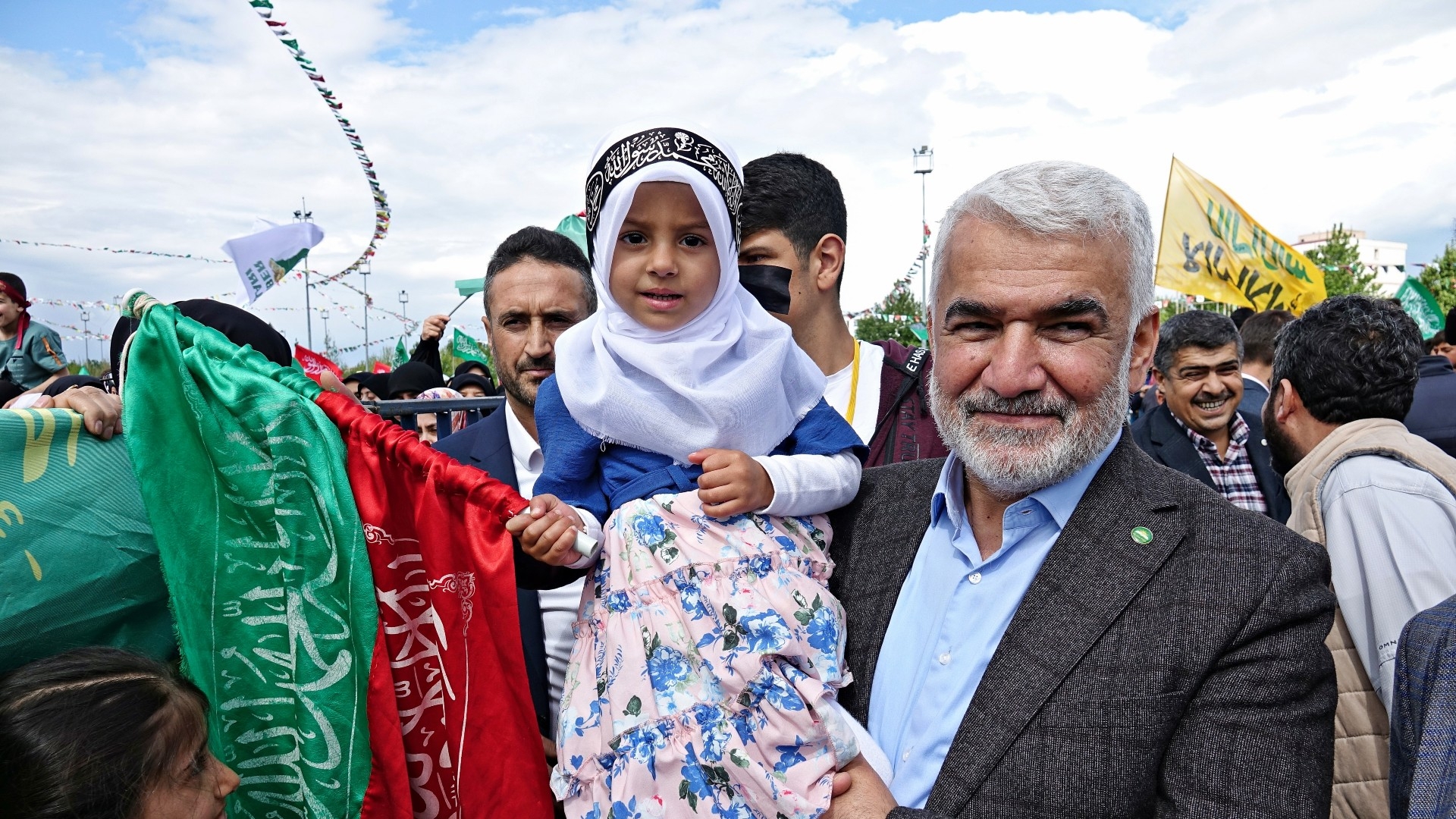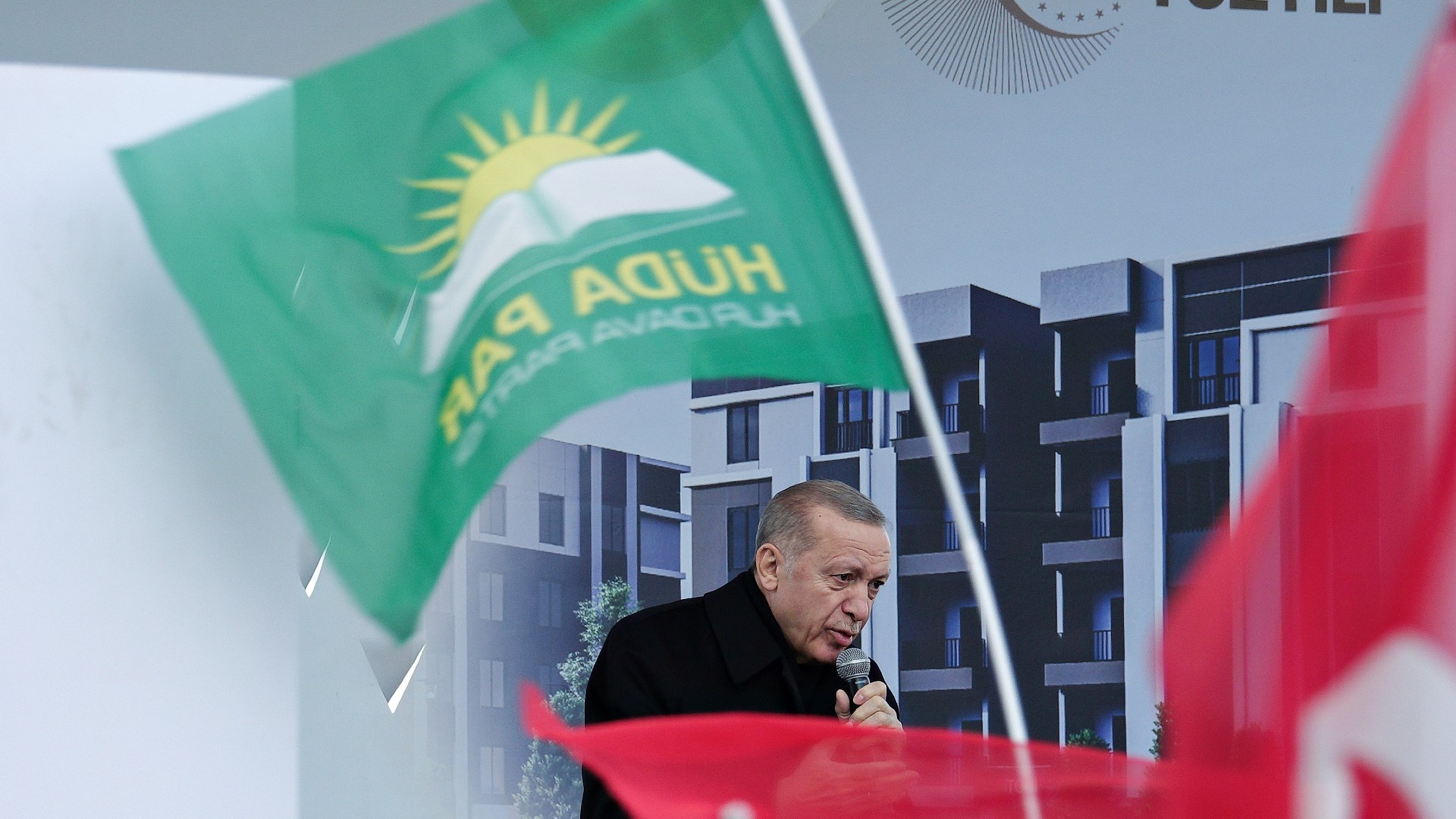Huda-Par: Erdogan's allies accused of being the Kurdish Hezbollah

Turkey's presidential and parliamentary elections have thrown up no shortage of hotly debated issues, none more so than the emergence of the Kurdish religious conservative Free Cause Party (Huda-Par).
Allied to President Recep Tayyip Erdogan, Huda-Par won four of the parliament's 600 seats on 14 May, running under the list of the ruling Justice and Development Party (AKP).
Those wins give another boost to Erdogan's People's Alliance coalition as the president campaigns for a run-off victory in the presidential election on Sunday.
To members of the opposition, who equate Huda-Par with a Kurdish armed group called Hezbollah, the new members of parliament are a frightening development.
Football fans have chanted "we don't want Hezbollah in parliament" in stadiums, opposition leaders have cited the armed group's murders in the 1990s and several activists have raised concern about women's rights, which Huda-Par have advocated rolling back in the name of tradition.
Stay informed with MEE's newsletters
Sign up to get the latest alerts, insights and analysis, starting with Turkey Unpacked
The Kurdish Islamic party's presence in parliament has become a lightning rod for Turkey's renewed debates about secularism and ethnicity, issues that will likely play out in Sunday's run-off.
The Kurdish Hezbollah
But what exactly is Huda-Par, and what is Hezbollah? Are they related to each other?
Firstly, the Turkey-based Hezbollah (which translates to party of God) has no connection to its more famous Lebanese namesake.
Secondly, Huda-Par officials strongly deny the allegations that their party is the political wing of Hezbollah, a designated terror organisation. That said, Huda-Par officials admit that some former Hezbollah fighters are among its membership.
The Kurdish Hezbollah emerged in 1979, around the same time as the Kurdistan Workers' Party (PKK), as an Islamist armed group. Its focus was on overthrowing Turkey's secular political system and advocating for Kurdish rights, including safeguarding the Kurdish language.
Yet the conflict that primarily preoccupied Hezbollah was not against state forces, but with the PKK.
Viewing the PKK as an organisation founded by infidels to corrupt religious Kurds with Marxist ideology, Hezbollah armed itself in the 1990s and began battling PKK fighters in Kurdish-dominated cities.
Many believe that the Turkish state facilitated Hezbollah's fight against the PKK. Nevertheless, Hezbollah's anti-PKK stance swiftly transformed into a takfiri understanding of Islam, whereby any Muslim who did not strictly adhere to Islamic rules or follow Hezbollah's interpretation was labeled an infidel deserving punishment.
Omer, head of a well-known Islamic community in the Kurdish-majority city of Diyarbakir, told Middle East Eye that Hezbollah was so extreme that its members started targeting Islamic scholars who did not support their cause. He asked MEE not to disclose his surname due to the sensitivity of the subject.
"In the 1990s, they were so radical that they harmed religious Muslims more than the state and the PKK."
During the second half of the 1990s, police uncovered mass graves and torture chambers linked to Hezbollah in Konya, Adana and elsewhere.
One of their most prominent targets was Konca Kuris, a Muslim feminist activist who believed the Quran needed to be reinterpreted to align with modern needs. She was found dead in Konya in 2000, with police believing she had been tortured to death by Hezbollah in 1999.
Another well-known figure allegedly assassinated by Hezbollah was Gaffar Okkan, head of police in Diyarbakir.
Okkan had played a key role in crushing Hezbollah in the southern city, but died along with five other policemen in an ambush suspected to have been conducted by the armed group.
The group also kidnapped many prominent Kurdish figures, interrogating and torturing them.
One kidnap victim told Middle East Eye that they had to leave their Kurdish city hometown and resettle in western Turkey following their release.
In 2000, during a police raid on a mansion in Istanbul's Beykoz, Hezbollah leader Huseyin Velioglu was killed. Following this operation, the group is believed to have been dismantled.
Yet many, like Omer in Diyarbakir, believe that it re-emerged as Huda-Par as a legal, non-armed political party.
"Their understanding of Islam and approach to politics have changed since the killing of Velioglu," Omer said.
"They have made peace with other Islamic communities in the [Kurdish] region. They have even apologised to many Islamic scholars. They are now focusing on social activities such as delivering aid to poor people or organising huge ceremonies to celebrate the prophet's birth."
Indeed, around one million people get together in Diyarbakir every year in April in an event backed by Huda-Par officials, featuring sermons and songs in Turkish and Kurdish.
Omer believes that the foundation of Huda-Par as a legal political party has also sparked controversy among former Hezbollah fighters, prompting its most radical wing to disassociate from the party.
Mashuq Kurt, an expert on Hezbollah at Royal Holloway, University of London, told MEE that after 2000 the group underwent "a silent period for a few years and transformed into legal entities in the mid-2000s".
"They remain very conservative and loyal to the Islamist ideology, yet their methods changed, and their activities have been legalized in the past two decades," he said.
Huda-Par denies allegations
Huda-Par was officially established in 2012 as a political party after receiving necessary permissions from the interior ministry.
Its leader, Zekeriya Yapicioglu, denies the allegations that his party is a successor to Hezbollah, but has also said he does not view the armed group as a terror organisation.
When asked to comment on the allegations and origins of the party, a Huda-Par official told MEE: "All the information about our party exists on the webpage."
Kurt argues that Hezbollah and Huda-Par enjoy "a shared ideology and support base... but only the judiciary can establish an organic tie between the groups".
Even so, the opposition is determined to draw a distinct line linking the party and Hezbollah, highlighting Huda-Par's criticism of Turkish secularism and the armed group's violent history.
Huda-Par's party programme casts Kurdish uprisings as reactions against secularism and Turkification and denounces the state's subsequent crackdown, which it says killed hundreds of thousands of people.
It asks the Turkish state to issue an official apology and pay compensation to the victims.
The programme also asks for the recognition of Kurds in the constitution, declaring both Turks and Kurds as "the constitutive founders of the country". It says Kurdish must be accepted as the second official language and be used in education.
Famous phrases of Mustafa Kemal Ataturk, founder of the Turkish republic, that lionise Turks should be removed from schools and state institutions, it says. The programme also demands that religious schools be given official status.
These demands are no different from that of the Peoples' Democratic Party (HDP), the left-wing pro-Kurdish party frequently accused by the government and its allies of being linked to the PKK.
Huda-Par nonetheless counts Turkish nationalists such as the MHP and recently presidential candidate Sinan Ogan as its electoral allies.
A useful alliance
Clues to why the AKP, MHP and others are happy to sit alongside Huda-Par can be seen in recent comments by Interior Minister Suleyman Soylu.
Earlier this week, he told a TV programme: "The most important step taken by Turkish Republic and Turkish politics in the last few years is [the alliance with] Huda-Par. You will see in 10 years… how the conservative axis in the east and southeast of Turkey will gain a significant position."
In the 2018 elections, Huda-Par received 0.31 percent of the vote, failing to gain a single seat. This year it ran under the AKP list, so it is unknown how many votes went specifically to the Kurdish party.
Soylu, however, said he believes the numbers are unimportant, and has denied the party has any links with Hezbollah.
The government also accuses the opposition of hypocrisy, pointing to previous meetings between Huda-Par and the parties in the Table of Six.
A former HDP member, who asked to remain anonymous, told MEE their party has long been aware of the AKP plan to co-opt Huda-Par.
"People, especially young people, will not remember the 1990s and Hezbollah's atrocities," they said.
According to the ex-HDP member, Huda-Par can appeal to conservative religious voters and promise economic benefits due to its alliance with the government.
"In this way, they will try to lure more votes from conservative religious Kurds."
Kurt believes that Huda-Par will have "more room and platforms to disseminate its messages and activities" with four MPs now in parliament.
Middle East Eye delivers independent and unrivalled coverage and analysis of the Middle East, North Africa and beyond. To learn more about republishing this content and the associated fees, please fill out this form. More about MEE can be found here.







